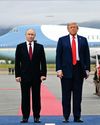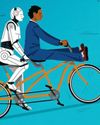Essayer OR - Gratuit
The World According to Biden
Time
|June 24, 2024
Inside the President’s efforts to sustain the American century

BIDEN IN THE OVAL OFFICE IN MAY 28
In the Cabinet Room, with sun pouring through French doors from the Rose Garden outside, he remembers the first time he sat around the long mahogany table, its highbacked leather chairs ordered by seniority. It was more than 50 years ago, Biden says, and Richard Nixon told National Security Adviser Henry Kissinger to brief the 30-year-old first-term Delaware Senator on the still secret timing of the U.S. withdrawal from Vietnam. Walking slowly through the halls, the President unspools anecdotes about heads of state: Vladimir Putin, Xi Jinping, Emmanuel Macron. In the Oval Office, he talks about his childhood home in Scranton, Pa., and the 2008 phone call from Barack Obama asking Biden to be his running mate.
Biden recounts these memories over the course of more than 90 minutes on a warm spring day, speaking in a quiet, sometimes scattershot way. The impression he gives is one of advancing age and broad experience, of a man who has lived history. Biden leads the U.S. as the American century is fading into an uncertain future, a changing world of threats, opportunities, and power shifts. At 81, he holds fast to a vision that has reigned since World War II, in which a rich and powerful America leads an alliance of democracies to safeguard the globe from tyranny.
On June 6, Biden would travel to Normandy, France, to memorialize an event that has served for eight decades as a focal point of this vision. He will arrive as the 12th-and certainly the last-American President who was alive on that day in 1944, when 73,000 American troops led the largest amphibious invasion in human history, accelerating Nazi Germany's defeat and Europe's liberation. For generations, D-Day has been a hallowed anniversary. The President says commemorating it is as much about the future as the past. "We're playing [that role] even more," Biden says. "We are the world power."
Cette histoire est tirée de l'édition June 24, 2024 de Time.
Abonnez-vous à Magzter GOLD pour accéder à des milliers d'histoires premium sélectionnées et à plus de 9 000 magazines et journaux.
Déjà abonné ? Se connecter
PLUS D'HISTOIRES DE Time

Time
Where electricity bills are on the ballot
Clockwise from top left: downtown Atlanta at night; high-voltage transmission lines near Rome, Ga.; a QTS data center in Atlanta's Howell Station neighborhood; Georgia Power's coal-fired Plant Bowen in Euharlee, Ga.
14 mins
September 08, 2025

Time
THE 100 MOST INFLUENTIAL PEOPLE IN ARTIFICIAL INTELLIGENCE
MATTHEW PRINCE HAD TO BE CONVERTED to the belief that AI is eating the web.
3 mins
September 08, 2025

Time
Two good men confront the Task of forgiveness
CRIME DRAMAS, IN OUR DISTRACTED TIMES, TEND TO front-load said crimes. More often than not, there’s a murder within the first five minutes. This is only one of the genre’s many implicit rules that HBO’s Task breaks. The series from Mare of Easttown creator Brad Ingelsby opens with a montage of quotidian scenes from the lives of two men. Weary Tom Brandis (Mark Ruffalo) folds his hands in prayer, dunks his face in a sink full of ice water, downs Advil while driving. Rugged Robbie Prendergrast (Tom Pelphrey) carries his sleeping son to bed, pours himself a tall mug of coffee, perks up at a radio ad for a dating app.
3 mins
September 08, 2025

Time
Beyond human control
THE RACE FOR ARTIFICIAL GENERAL INTELLIGENCE POSES NEW RISKS TO AN UNSTABLE WORLD
11 mins
September 08, 2025

Time
In exile, I lost India but gained a home
ON NOV. 7, 2019, THE GOVERNMENT OF PRIME MINISTER Narendra Modi revoked my Overseas Citizenship of India (OCI), effectively banning me from the country I grew up in. India was where my mother and grandmother lived. Where four out of my five books of fiction and nonfiction were set. Where I had returned after college in the U.S. with the aim of being “an Indian writer.”
6 mins
September 08, 2025

Time
POOR VOTE, SWING VOTE
On the one hand, this is the worst of times: power is concentrated in the hands of people who pray at the opening of Congress, then prey on the people they swore an oath to serve.
3 mins
September 08, 2025

Time
SUMMER OF OUR DISCONTENT
In The Roses, Olivia Colman and Benedict Cumberbatch embrace a movie season of not- so-romantic comedies
6 mins
September 08, 2025

Time
PUTIN’S BRUSH-OFF
The Kremlin appears in no rush to negotiate peace with Ukraine—despite Trump’s efforts
3 mins
September 08, 2025

Time
The agentic age: a new frontier for AI and humans
FOR THE PAST YEAR, I’VE BEEN RUNNING SALES- force with a colleague who never sleeps, never takes vacations, and has read more than I could in 100 lifetimes. On a typical day, sitting with a few executives around the table, I’ll ask it to evaluate a competitor's moves, refine a keynote draft, or surface strategic blind spots we might have missed.
5 mins
September 08, 2025

Time
Why are so many women leaving the workforce?
212,000. THAT'S HOW MANY WOMEN AGES 20 AND OVER have left the U.S. workforce since January, according to the most recent jobs numbers released Aug. 1 by the Bureau of Labor Statistics. (By contrast, 44,000 men of the same age have entered the workforce since January.) The numbers are especially stark for women with children. From January to June, the labor-force participation rate of women ages 25 to 44 living with a child under 5 fell nearly 3 percentage points, from 69.7% to 66.9%, says Misty Lee Heggeness, an associate professor of economics and public affairs at the University of Kansas.
2 mins
September 08, 2025
Listen
Translate
Change font size
